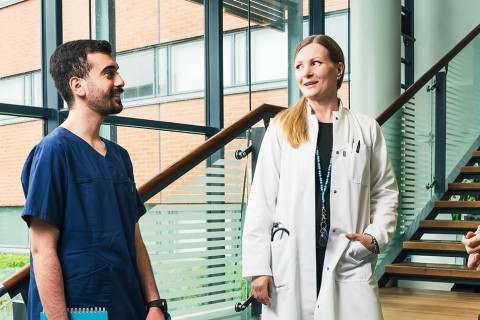Open University: Post-Soviet Public Health, Spring 2024

- Date:
- 18.3.2024 - 3.5.2024
- Credits:
- 5 ECTS credits
- Location:
- Kuopio
- Continuous learning category:
- Teaching, education and psychology, Social welfare and health care
- Teaching format:
- Online teaching
- Price:
- -

Through this online course, students will obtain basic understanding of various regional health-related changes and trend that have followed the collapse of the Soviet Union since early 1990s. Main focus is in Russia and other former Soviet states, but some of the content covers also the larger geopolitical region in which Soviet Union had immediate influence until 1980s. Post-change trends in public health are reviewed, as well as challenges of current population health and future public health prospects in the region. Public health implications of the Russian war and aggression against Ukraine is one of the topics/modules during the course.
Foundations of public health, such as food safety, health systems, and environmental health in the region are visited. A general goal is to underline the link between social, political, economic, and cultural changes on one hand, and public health on the other. The course will help students with little prior experience in health sciences to independently examine public health data and reports. More advanced students of public health may develop their skills in updating health-related data on different macro-regions, for which the former Soviet Union makes an interesting historical example. The Russian-instigated war in Ukraine makes a brutal but also and interesting public health case of study for this course. Generally, the course aims at students finding out not only data on health problems in the region, but also encouraging them to look for possible policy suggestions and solutions of how to tackle existing and emerging challenges.
The content will deal with the profound social, economic, political and cultural changes since 1980s and 1990s that have affected population health trends, health care systems and health policy measures in the region that consists of the former Soviet Union as well as some adjoining spheres of its influence, e.g. in Central Eastern European countries. As an example, premature mortality increased sharply in Russia and some other former Soviet states in 1990s, and despite leveling off later, they have remained remarkably high compared to most other European countries, and even as comparison with many populations in Asia. This development is further reviewed from various perspectives, such as the burden of noncommunicable diseases, which remains particularly heavy in many parts of Russia, Caucasus, and Central Asia. Controlling of infectious disease epidemics, has also proved to be challenging in the region that suffers from endemic multiresistant tuberculosis, high rates of HIV in some areas, etc. The Covid-19 pandemic in early 2020s is a topic of its own in this sense, and country-specific responses and policies in the region are reviewed. Rates of external deaths, including injuries, suicides, alcohol poisonings, drug-related deaths, and violence, have remained relatively high throughout the region, and will be one of the topics. Migration within former Soviet countries and across nearby borders, which at times have been facilitated for geopolitical reasons, has also played a role regarding population health and service provision, and thus will looked at.
Part of the public health development during past decades is seen as a result of wider global, regional and local change, but some remnants from the Soviet era can be identified in the public health statistics and structures in these societies. In addition to current challenges, new evolving patterns and trends in public and environmental health will be discussed.
One of the modules specifically examines the health systems and health care services that have been in transition from the old Soviet model in most parts of the region. Recent or ongoing changes in health systems (partial or total privatization of certain services, revising of health funding schemes, shortage of trained staff, outdated technology and infrastructure, relative lack of pharmaceuticals, weak development in own research etc.) will be examined, as they easily contribute to health within many of these populations. Additional threats come from environmental factors, such as poor air quality, polluted water sources, and uncertain food security and food safety in some areas. Some major challenges that will be discussed are global, such as the unpredictable effects of climate change on public and environmental health.
Teachers:
Jussi Kauhanen, MD, PhD, Professor of Public Health, Course Director (general public health, epidemiology, sustainable development, impacts of social/political/economical transitions on population health, global health issues).
Sohaib Khan, PhD, MPH, MBBS, Assistant Professor of International Health (culture and health in the region, role of religion, sustainable development goals, specific public health issues on selected countries).
Javkhlanbayar Dorjdagva, PhD, MPH, Assistant Professor of Health Policy (health systems in transition, especially in Central Asia, health economics, public health policy)
Arja Lyytinen, PhD, Adjunct Professor in Public Health Nutrition (food security and food safety, nutrition and health, with specific focus on Central Asia)
Kastytis Smigelsgas, PhD, MPH, Professor (public health in Baltic region, special focus on public health development in Lithuania).
Visiting scholars and lecturers affiliated with Russian, Central Asian, Baltic, East-Central European etc. academic institutions may be involved.
Study Methods:
This course will be conducted completely online.
Evaluation criteria:
This study unit is graded on a scale of 0-5. The evaluation is based 30 % on participation in teaching sessions and discussions, and 70 % on the final essay/report/policy brief.
This course will be conducted completely online.
Arranged every two years.
Registration for spring semester 2024 opens on 08.12.2023 at 9:00.
This course is a part of advanced studies in Public Health. Please make sure you have sufficient skills and understanding of English language. Successful completion of the course requires substantial amount of independent study.
This online course consists of 6 separate weekly modules, an open discussion forum, and the final report.
The course is full online (virtual). The learning methods are as follows:
Independent readings. These include e-books and chapters, selected articles, reports, info sheets, and other and similar online material. Some of them will be required as preparatory readings preceding lectures and discussions, some are to be read after the presentations. Readings include both compulsory and highly recommended material.
Prerecorded video lectures and/or streamed online lectures. Online lectures, a total of 2-6 hours in each weekly module. Some are prerecorded, some streamed live online, and all lectures are uploaded to the Moodle platform to be reviewed during and shortly after the course. The lectures are provided by public health specialists and researchers from the UEF faculty, as well as by some other scholars engaged in general public health, epidemiology, health policy, environmental health, etc. Based on availability, experts from the actual countries in question will be involved in the teaching as well.
Short assignments. These vary in each module depending on instructor’s choice, and might include mini-essays, quizzes, etc. The assignments often require independent use of online health databases and other such sources to examine specific public health issues in question. These short assignments should be completed by the end of each week’s module, before student is allowed to move on to start completing the next module. Together with other activity in participation (discussions etc.) these will form the basis for 30 % of the student grade evaluation for the course.
Discussion sessions and General Discussion Open Forum. During each of the weekly modules, discussion by students on the Moodle platform on that specific theme is encouraged. After all the six modules, the platform is set for General Discussion Open Forum, where students can reflect and comment on any previously presented themes, plus whatever else students feel relevant with respect to the course and its topics.
Final paper. Writing of a scholarly essay/report/policy brief on one a given topic/country is required for the successful passing of the course. The idea is to take a closer look at one of the countries that used to belong to the Soviet Union proper, or its nearby domain (such as the former Warsaw Pact countries). The country can be freely chosen by each student themselves. More detailed directions, suggested sources etc., for this final assignment be announced at the start of the course. This paper forms the basis for 70 % of the student grade evaluation for the course.
Study materials:
E-book, digital articles, reports, statistics, national, regional and global interactive databases, policy papers etc. Videos. Online lectures.
Some specific material include:
The WHO country health profiles. E.g. for Russia: https://www.who.int/countries/rus/en/.
(General background): Cockerham, William C. Health and social change in Russia and Eastern Europe. New York: Routledge, 1999. E-book available at EBSCOhost (Finna).
Updated list with appropriate links will be given in part prior to the course, and partly at the beginning of each weeks thematic module/block.
Optional textbooks (e-books), recommended for broader understanding of social inequalities in health:
Bartley M. Health inequality: An introduction to concepts, theories and methods. Second edition. Cambridge: Polity Press, 2017.
Marmot M. The health gap: The challenge of an unequal world. London: Bloomsbury, 2016
Literature acquisition costs / borrowing fees are not included.
English-language courses are free for the 2023-2024 academic year for those with the status of temporary protection from Migri.
https://migri.fi/tilapainen-suojelu (in Finnish)
https://migri.fi/en/temporary-protection (in English)
https://migri.fi/uk/timcasovij-zahist (in Ukrainian)
See more on studying at UEF while under temporary protection here:


